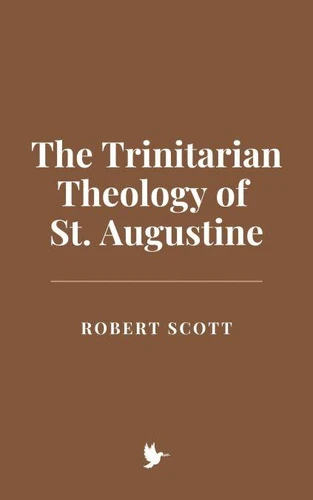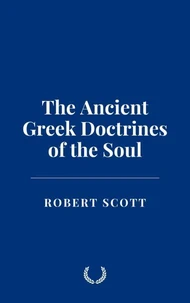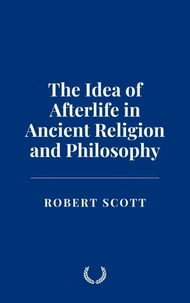The Trinitarian Theology of St. Augustine
Par :Formats :
Disponible dans votre compte client Decitre ou Furet du Nord dès validation de votre commande. Le format ePub est :
- Compatible avec une lecture sur My Vivlio (smartphone, tablette, ordinateur)
- Compatible avec une lecture sur liseuses Vivlio
- Pour les liseuses autres que Vivlio, vous devez utiliser le logiciel Adobe Digital Edition. Non compatible avec la lecture sur les liseuses Kindle, Remarkable et Sony
 , qui est-ce ?
, qui est-ce ?Notre partenaire de plateforme de lecture numérique où vous retrouverez l'ensemble de vos ebooks gratuitement
Pour en savoir plus sur nos ebooks, consultez notre aide en ligne ici
- FormatePub
- ISBN8227653215
- EAN9798227653215
- Date de parution16/11/2024
- Protection num.pas de protection
- Infos supplémentairesepub
- ÉditeurBig Dog Books, LLC
Résumé
This work delves deeply into the Trinitarian theology of St. Augustine, exploring its foundations, development, and enduring influence. Augustine's De Trinitate serves as a cornerstone of Western Christian thought, offering profound insights into the unity and relational distinctions of Father, Son, and Holy Spirit. Grounded in Scripture and enriched by Neoplatonic philosophy, Augustine articulates a vision of the Trinity that is both intellectually rigorous and spiritually transformative.
His reflections on divine simplicity, eternal processions, and the missions of the Son and Spirit reveal a God who is not only a transcendent unity but also an intimate communion of love. Throughout this study, Augustine's use of psychological analogies, particularly the triad of memory, understanding, and will, is critically examined, revealing both the strengths and limitations of his approach. His emphasis on love as the essence of the Trinity and the Spirit as the bond of love between the Father and the Son highlights the relational nature of God and its implications for human relationships, community, and worship.
The work also addresses Augustine's integration of the Trinity into his broader theological framework, including his teachings on creation, redemption, prayer, sacraments, and the Church. While Augustine's Trinitarian theology has faced critiques, particularly from the Eastern Orthodox tradition and modern scholars, its enduring legacy continues to shape theological discourse. This study engages with these critiques and developments, demonstrating how Augustine's insights offer a foundation for dialogue and renewal in contemporary theology.
Ultimately, this work presents Augustine's Trinitarian theology not merely as a doctrinal system but as a lived reality, inviting believers to participate in the eternal life and love of the triune God. It is a theology that challenges the mind, nourishes the soul, and inspires the Church to reflect the unity, diversity, and relational love of the Trinity in its mission and witness to the world.
His reflections on divine simplicity, eternal processions, and the missions of the Son and Spirit reveal a God who is not only a transcendent unity but also an intimate communion of love. Throughout this study, Augustine's use of psychological analogies, particularly the triad of memory, understanding, and will, is critically examined, revealing both the strengths and limitations of his approach. His emphasis on love as the essence of the Trinity and the Spirit as the bond of love between the Father and the Son highlights the relational nature of God and its implications for human relationships, community, and worship.
The work also addresses Augustine's integration of the Trinity into his broader theological framework, including his teachings on creation, redemption, prayer, sacraments, and the Church. While Augustine's Trinitarian theology has faced critiques, particularly from the Eastern Orthodox tradition and modern scholars, its enduring legacy continues to shape theological discourse. This study engages with these critiques and developments, demonstrating how Augustine's insights offer a foundation for dialogue and renewal in contemporary theology.
Ultimately, this work presents Augustine's Trinitarian theology not merely as a doctrinal system but as a lived reality, inviting believers to participate in the eternal life and love of the triune God. It is a theology that challenges the mind, nourishes the soul, and inspires the Church to reflect the unity, diversity, and relational love of the Trinity in its mission and witness to the world.
This work delves deeply into the Trinitarian theology of St. Augustine, exploring its foundations, development, and enduring influence. Augustine's De Trinitate serves as a cornerstone of Western Christian thought, offering profound insights into the unity and relational distinctions of Father, Son, and Holy Spirit. Grounded in Scripture and enriched by Neoplatonic philosophy, Augustine articulates a vision of the Trinity that is both intellectually rigorous and spiritually transformative.
His reflections on divine simplicity, eternal processions, and the missions of the Son and Spirit reveal a God who is not only a transcendent unity but also an intimate communion of love. Throughout this study, Augustine's use of psychological analogies, particularly the triad of memory, understanding, and will, is critically examined, revealing both the strengths and limitations of his approach. His emphasis on love as the essence of the Trinity and the Spirit as the bond of love between the Father and the Son highlights the relational nature of God and its implications for human relationships, community, and worship.
The work also addresses Augustine's integration of the Trinity into his broader theological framework, including his teachings on creation, redemption, prayer, sacraments, and the Church. While Augustine's Trinitarian theology has faced critiques, particularly from the Eastern Orthodox tradition and modern scholars, its enduring legacy continues to shape theological discourse. This study engages with these critiques and developments, demonstrating how Augustine's insights offer a foundation for dialogue and renewal in contemporary theology.
Ultimately, this work presents Augustine's Trinitarian theology not merely as a doctrinal system but as a lived reality, inviting believers to participate in the eternal life and love of the triune God. It is a theology that challenges the mind, nourishes the soul, and inspires the Church to reflect the unity, diversity, and relational love of the Trinity in its mission and witness to the world.
His reflections on divine simplicity, eternal processions, and the missions of the Son and Spirit reveal a God who is not only a transcendent unity but also an intimate communion of love. Throughout this study, Augustine's use of psychological analogies, particularly the triad of memory, understanding, and will, is critically examined, revealing both the strengths and limitations of his approach. His emphasis on love as the essence of the Trinity and the Spirit as the bond of love between the Father and the Son highlights the relational nature of God and its implications for human relationships, community, and worship.
The work also addresses Augustine's integration of the Trinity into his broader theological framework, including his teachings on creation, redemption, prayer, sacraments, and the Church. While Augustine's Trinitarian theology has faced critiques, particularly from the Eastern Orthodox tradition and modern scholars, its enduring legacy continues to shape theological discourse. This study engages with these critiques and developments, demonstrating how Augustine's insights offer a foundation for dialogue and renewal in contemporary theology.
Ultimately, this work presents Augustine's Trinitarian theology not merely as a doctrinal system but as a lived reality, inviting believers to participate in the eternal life and love of the triune God. It is a theology that challenges the mind, nourishes the soul, and inspires the Church to reflect the unity, diversity, and relational love of the Trinity in its mission and witness to the world.























